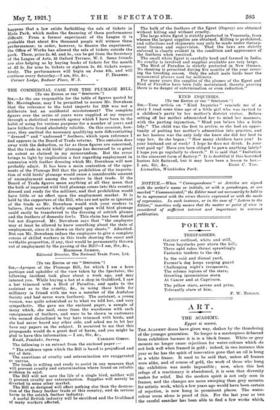THE COMMERCIAL CASE FOR THE PLUMAGE BILL. [To THE EDITOR
OF THE " SPECTATOR.") Sia,—As the one responsible for the table of figures quoted by Mr. Massingham, may I be permitted to assure Mr. Downham that the reference to the total imports for 1920 was not a deliberate but an accidental misstatement? The complete figures over the series of years were supplied at my request through a statistical research agency which I have been in the habit of using for various purposes for a number of years and have hitherto found absolutely reliable. On this occasion, how- ever, they omitted the necessary qualifying note differentiating "dressed " and "undressed " feathers, which upon reference I find appears in the Board of Trade returns. This omission does away with the deduction, so far as these figures are concerned, that the trade in wild birds' plumage has decreased to so great an extent as claimed in my memorandum. But the error brings to light by implication a fact regarding employment in connexion with feather dressing which Mr. Downham will now probably admit. It has been a main contention of the oppo- nents of the Plumage Bill that the prohibition of the importa- tion of wild birds' plumage would cause a considerable amount of unemployment among the workers in that trade. If the Board of Trade figures mean anything at all they mean that the bulk of imported wild bird plumage comes into this country dressed and ready for the milliner, and that prohibition would have little or no effect upon the employment market. It is held by the supporters of the Bill, who are not quite so ignorant of the trade as Mr. Downham would wish your readers to believe, that workers wholly engaged upon wild bird plumage could easily be transferred to the dressing of ostrich plumes and the feathers of domestic fowls. This claim has been denied but not disproved. Mr. Downham says that " the employers may at least be allowed to know something about the state of employment, since it is shown on their pay sheets." Admitted. But can Mr. Downham induce the employers to give a complete census of skilled workers in this trade showing the exact and verifiable proportion, if any, that would be permanently thrown out of employment by the passing of the Bill ?—I am, Sir, &c.,
HOLBROOK JACKSON, Editorial Director. The National Trade Press. Ltd.


































 Previous page
Previous page